
Interview with vocalist Blaze Bayley
Interview conducted by Luxi Lahtinen
Date online: October 30, 2025
Live pictures taken by PP Marila
Thanks to Mark and Chris Appleton for setting up the interview
On October 17 and 18, 2025, the walls of Helsinki's legendary rock venue, On the Rocks, echoed with raw energy and heavy metal history, as Blaze Bayley stormed the stage for two sold-out nights that fans won't soon forget. The British metal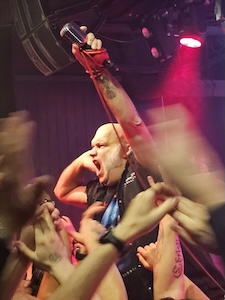 icon, known for his powerhouse vocals and passionate stage presence, returned to Finland as part of a special tour commemorating the 30th anniversary of The X Factor, his debut album with Iron Maiden.
icon, known for his powerhouse vocals and passionate stage presence, returned to Finland as part of a special tour commemorating the 30th anniversary of The X Factor, his debut album with Iron Maiden.
Released in 1995, The X Factor marked a bold new era for Maiden and introduced Blaze as the band's new frontman during a transitional yet deeply creative period. Now, three decades later, Blaze and his band are revisiting the landmark album with a tour that's both a celebration and a reawakening, giving long-time fans the chance to relive the era and newcomers an opportunity to discover its power live.
We sat down with Blaze Bayley on October 16th to talk about the enduring legacy of The X Factor, the energy of the Finnish crowd, and how it feels to bring this music back to life after 30 years.
First off, welcome to Finland once again, Blaze.
Blaze Bayley: Thank you. It's a wonderful place for me, Finland. It means a lot because of starting again from nothing, Thomas Zwijsen and me, we came here acoustic. One of my fans from Mäntyharju got in touch, this is a long time ago now, and said, "Why don't you ever come to Finland?" I said, "Because nobody books me. I don't have a big agent. I'm a very small artist, independent." He said, "I'll book you." He went to the pub in his town and another couple of pubs and arranged enough gigs that would pay for the airfare. He put us up at his house as well. That was the start of coming back to Finland, just that little acoustic tour. It just went so well.
Do you think it's also kind of homey to get back to Finland over and over again?
Blaze: Yes, I do because I always stayed at his house. After that, we stayed friends. It is like a second home, really. When I think of Finland, it's more like a family vibe for me. It's nice, and we've been all over this wonderful country, north and south, summer and winter. It's incredible. We're playing in Mäntyharju, which, of course, is quite far away from Helsinki, and people would say, "Why don't you come to Helsinki?" My friend would say, "You get everything in Helsinki, why don't you come to Mäntyharju?"
That was fun because that was the only gig we could get. Then we were lucky enough to get a booking here at On the Rocks. We got on well with the manager. When The X Factor came out on vinyl, we were here in Helsinki and we were stopping at a friend's house, and I said, "Why don't we do a signing?" They let us do a signing upstairs at the place, and we put it online on Facebook and everything. Then what happened was all the fans went to all the record shops around the city and bought all of the vinyl for The X Factor and came, and I signed everything for everyone. It was really fun.
It was totally unexpected. We put it online that day, "Oh, I'm here. I'm doing a signing." That was it. It was really, really cool. X Factor sold out here in Helsinki that day. That was really fun, man. Really fun.
30TH ANNIVERSARY OF THE X FACTOR
It's hard to believe that The X Factor is now 30 years old!
Blaze: Isn't it? On this tour, there are people who I played for 30 years ago in Scandinavia. It was my 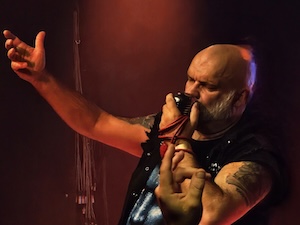 first time here. There are a lot of cherished memories of my first trip here with The X Factor. You can't believe it's 30 years ago. You look at people and go, "Wow, man, how does that T-shirt still fit you?" It was incredible, really.
first time here. There are a lot of cherished memories of my first trip here with The X Factor. You can't believe it's 30 years ago. You look at people and go, "Wow, man, how does that T-shirt still fit you?" It was incredible, really.
You know what I've noticed as we've been rehearsing and I've been getting the lyrics back in my head? Some of the songs, which we never did live, I had to learn because we'd only done them in the studio. Some of those lyrics could have been written yesterday. It's incredible. Thirty years ago, some of those lyrics were written and it could just be yesterday. It's incredible, that feeling.
I'm doing it for the nostalgia and the entertainment of it, and it's fresh. I feel that, in those 30 years, my voice has developed and changed so much. I'm a much better singer now than I was when I made the album. I have more control. I have more voice than I had. When we started writing for The X Factor, Steve Harris said, "Nothing is written. We're starting from scratch. Doesn't matter who writes the songs as long as they're great songs."
As we were going through the writing, he would go, "Oh, just try it there. Let's try it here," and it would be a part of my voice, in the lower registers, I'd never really used before, but he had a sense that there was something there. That's what I found in the writing and recording of The X Factor. Of course, now that's developed and strengthened, and so there's more emotion in the performance and there's more emotion in the lyrics now than there was on the album.
Yes, when it was originally written.
Blaze: Yes. You don't rehearse much either. You get it right, "Okay, let's rehearse it. Let's record it. This is it." When you live with the songs for a while, then it takes on something else. It's a lot more like this conversation than it is you just listening to me. That's the difference. I feel that that comes across. It's a great opportunity, but also a big excuse to come back and go, "Here are these old songs, but they're also like old friends."
You don't come to the show and watch Blaze Bayley; you come and you're part of the concert. You're part of the experience. We're all together. It's something a bit different. We've all known these songs for 30 years. There are some newer 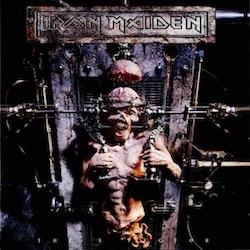 fans, of course, but a lot of people have known them for 30 years, known that album for a long time, and never thought they'd hear songs like "The Unbeliever." People never thought they would hear "I Live My Way" or "Justice of the Peace," which has been, "All right, we've got to do those B-sides."
fans, of course, but a lot of people have known them for 30 years, known that album for a long time, and never thought they'd hear songs like "The Unbeliever." People never thought they would hear "I Live My Way" or "Justice of the Peace," which has been, "All right, we've got to do those B-sides."
There were a few technical difficulties and a few breakdowns. We had a lot of time to make The X Factor, but a few days disappeared because of technical problems with the tape machines. It was two digital Mitsubishi 32-track machines which sync up together. Worked perfectly most of the time. It's fantastic. I like digital recording because you can do so much with it and you're just not worried about the hiss back then like you were with analog, but sometimes they would spin off. It was a hot summer, and I think the heat affected them.
We lost a few days and you can't get them back. Then things are going well and suddenly, there's a tour and you've got to go on the tour, so you've got to finish the album, and it's got to be done and everything. It's like, "Oh, so this is your album. Right, let's choose the songs. Let's mix these." I think if we'd had another two or three months, then maybe these three B-sides, maybe they would have been on the album because Steve is adamant about this.
When I said, "Oh, what about B-sides?" he said, "We don't write B-sides." He said, "I don't start out any song thinking, oh, it'll be okay as a B-side." He said, "Everything has to be good enough for the album." That's what you try to do. You try and put your heart and soul and make everything good enough for the album. Then you think what is the best picture, the best story we can tell with the songs that we have? Okay, if we put these songs together, we've got "2 A.M.," and "Unbeliever," and "Man on the Edge," and "Sign of the Cross," then we've got an album which takes us on a journey. We can complete that journey.
It was very, very interesting. I learned so much, man. That was probably the best thing about being in Maiden, what I learned about writing and recording. I'd worked in Abbey Road with Wolfsbane, with Brendan O'Brien. We'd worked with Rick Rubin in Los Angeles at Sound City Studios and all of that. With the writing and what I learned about my voice, that was really what I took away.
Then when I went to do Silicon Messiah, which I'm doing 25th anniversary shows for that, when I went to 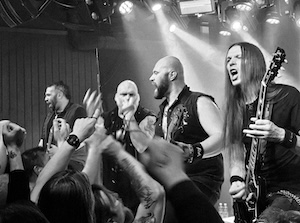 do that, these huge lessons and an extra third of my voice that I didn't know I had before was all then on the Silicon Messiah album. It was an incredible experience. It's nostalgic, but it's not an identical performance of The X Factor album. It's not that.
do that, these huge lessons and an extra third of my voice that I didn't know I had before was all then on the Silicon Messiah album. It was an incredible experience. It's nostalgic, but it's not an identical performance of The X Factor album. It's not that.
What it is, it's the book and the movie. If you've got your X Factor album, which you've had for years, and you love those songs, you're familiar with those songs, you've always got that. When you come to see me, it's a little bit different. There's always more in the book than the movie. The X Factor album, the recording, is the book. When you come to see the live show, it's the movie. I don't have any keyboards for one thing. There's none of that. Everything's 100% live. Nothing is triggered. Everything goes off of feeling.
As we were going through rehearsals, I would go, "You know what, I always felt it should be a harmony here, guitar harmony. Let's just do it." Yes, you might piss off fans that are purists, "Oh, it's not exactly the same as the album," but you know what, this is how I feel. I feel if we were writing it now, we would have that harmony guitar. This instrumental would go this way.
I was doing my best, I was confident, but the confidence I have now in my voice, in my singing is just a world apart from that young man back then doing his best. It's different. The ones that we've done so far, no one has mentioned the differences apart from saying, "I got all the feeling of nostalgia, and it felt fresh."
I'm so relieved about that because I thought I could get lambasted on the forums and online. "It's not the same as the other songs." The songs are all the same. Every lyric is the same, every melody is the same, every riff is the same, but there's just a little bit more to it because it's how I do it. It's the Blaze Bayley version of The X Factor. So far, it's gone very, very well.
IT'S A TURNING POINT
What does this milestone mean to you personally, and how do you feel looking back on that period of your life and career?
Blaze: It's a turning point, isn't it? It's a turning point for everything. For Maiden at the time, it was a very dark period. The band had almost disappeared. Some people were saying at that time, "Without Bruce Dickinson, Iron Maiden can't continue." The guys in the band are going, "No, you don't know us. This is not just about one person. 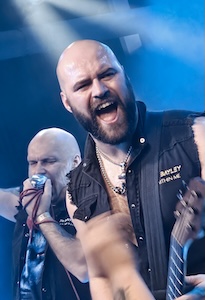 There's a lot more to Iron Maiden than that." They had to continue. They were questioning their whole existence at one point. It was difficult for the band.
There's a lot more to Iron Maiden than that." They had to continue. They were questioning their whole existence at one point. It was difficult for the band.
For me, I thought my musical career was over. I managed to get the audition for Iron Maiden. I was incredibly lucky. My voice is so different from Bruce's. They chose a different voice, and then went in this different direction, musically, a lot of intensity, dark lyrics as well. It's a big turning point. I've made 14 solo albums since The X Factor, and I've toured with everyone.
The X Factor is, like a pivot point where we're still together, we still do things. Learning so much about my voice and getting confidence, nothing can give you the confidence of knowing that you're a good songwriter. In the rock charts around the world and in some countries around the world, we had number one with "Man on the Edge." That's my lyrics and melody.
You say, "It's not that I'm not good enough, it's just that not enough people have found this. I haven't found my audience yet." That's what it means coming back after doing all my studio albums and everything. I think, "I don't have to do this. I've got nothing to prove. I'm doing okay. I'm living my dream of being a professional heavy metal singer. I've got incredible fans that helped me through the most dire circumstances when I had a heart attack. Really, I don't have to do it."
I'm choosing to do it because when we started thinking about it, I thought, "Oh, yes, we can do this. Oh, we can sing this." You know what? When we do "2 A.M.," that's going to be slightly different. "2 A.M." can be a much more emotional journey than it was because it's a true story. It's a lyric that I wrote years before I joined Maiden about your dream dying, about ending up working a job you hate for the money, feeling that you have no future, a desperate situation.
Then, more than 30 years later, here I am, able to sing that song and say to people, "Look, 30 years ago, I was desperate. I had nothing. My dream was dead. I wrote this lyric more than 30 years ago. Then, I got this opportunity, so you have to hold on."
You have to hold on. I'm 62, I survived a heart attack. I got through. I came back because my fans were there, and they supported me. If I've gone from working a miserable job and then the lyric I wrote about being miserable is on an Iron Maiden album, it becomes a huge song for fans. When the fans sing that song, it's incredible. It's just incredible. It's so incredible. You have to hold on.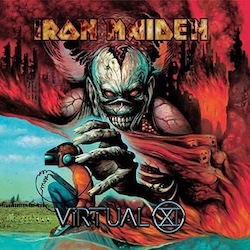
I didn't know that then. You have to hold on. Maybe you won't get your dream when you're 21 or 31 or 41 or 51, but 61, I've got my dream. That's it. I'm on the journey of living my dream. I'm not really interested in playing arenas or stadiums. Theaters are smaller. On the Rocks is such a great venue for me. It's very intimate. You can meet everybody. When the door opens, I'll be meeting every fan that walks through the door. That is included in your ticket price.
MEET & GREET SESSIONS
That's very nice because some artists charge extra money when they do these "Meet & Greet" sessions...
Blaze: Yes. When I joined Iron Maiden, EMI sold all of their factories. EMI, biggest record company in the world, stopped making physical music. That's it. They became promoters. It's because CDs went down. They thought everything would be streaming. We're not going to make any more. Let's get it while there's still some value in that. It's a business thing.
Tours didn't make money years ago. Bands undertook huge shows and propped up the tour with the money they got from CDs, and we saw these amazing rock shows. Actually, that costs more than the tickets. Now that is upside down. Now, a tour has to pay for itself. It cannot lose money. You've got to pay everybody's wages out of the money that comes in. How are you going to get that money in?
For some people, they go, "Okay, we'll charge for signing. We'll charge for the "Meet & Greet." We'll do that. You know what? We'll do it for a premium. We don't have to do much for it either." That's some people. There are some people that go, "Okay, you get this special thing and all of that because you're paying. It's something special." Other people really don't give a shit. They don't care.
For me, I don't need to do that. I have a small motorcycle, an old motorcycle, an old beat-up car, and I live in a small house. What's most important to me in my life is singing and performing and being there, being able to be with my fans. How can I do without the stories that my fans tell me when they come to the gig? This happened last weekend, a lady said, "I was in a terrible depression, I was suicidal thoughts every day, and I found your music, and I really feel it brought me back." Oh, it's incredibly humbling.
Yes, it is.
Blaze: I'm thinking of my listeners all the time. When we did War Within Me album, man, it was a war. You know what? If this is the album that you've been waiting two years for from your favorite singer, and you've been through COVID, and the world has stopped, and we think there's no more live gigs, what album do you want to get? You don't want to get 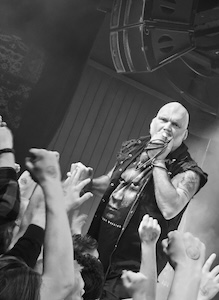 something that goes, "Oh, COVID's so miserable." No, you want an album that is, "Come on, keep going, keep going, keep going. We'll get through this. Come on, keep going. You're stronger than you know." That's what we did.
something that goes, "Oh, COVID's so miserable." No, you want an album that is, "Come on, keep going, keep going, keep going. We'll get through this. Come on, keep going. You're stronger than you know." That's what we did.
When we were writing, we were going, "You know that ending? That's not strong, is it? It has to be. Let's find a strong ending. That lyric, is that really the most positive thing I can have? Does that melody really, where it is? Does that uplift you? When you get to that instrumental section, is it just filling time, or is it going to captivate you? Is it going to express, 'Okay, now, let's tell you how you're going to do it. Come on, let's go. They'll tell you can't do it. Fuck them. Fuck them. They don't know you'." That was War Within Me, and that's what we did.
CHALLENGES OF THE X FACTOR
When The X Factor was originally released, it was a bold step for both you and Iron Maiden. What were some of the biggest challenges you faced during the recording and touring for that album?
Blaze: Yes, it was challenging because one of the things for me is I like to be able to see the engineer. The studio was the control room, and the mixing desk was upstairs, and the performance recording area was downstairs in the barn. That was challenging for me because it was a closed-circuit TV, but it was only one way, so you couldn't actually see the engineer and the producer. You get it on the headphones, of course.
That was a challenge for me to get those performances because I'm a live singer. I started in 1984 because Wolfsbane wanted to get on stage and play gigs, and that was it. We never thought about being a recording artist. That came, "Oh, you've got to get a record deal, and that's the next thing," and all of that. I hadn't really, before Maiden, thought too much about being a recording artist.
Often, that's what you had to do because that was the excuse to go out and play live. I always immersed myself in trying to do the best lyrics I could, even if I chose, "Right, this has to be simple." Or as a fan of Shakespeare, taking odd words and phrases and then putting them into a song and dressing it right. This is what this means. I think after that studio experience, after that, then I really thought about myself as a songwriter, after The X Factor.
Did you revisit the album when you were preparing for this anniversary tour? I mean, was there anything new that you discovered or reflected on with the passage of time?
Blaze: Yes, part of it is it's a very different sounding album. It's a dark-sounding album, and you have to make an adjustment to get used to those sounds. They're very different to what was on Seventh Son or Somewhere in Time. The sounds are very different. Different even to No Prayer for the Dying. It's an adjustment, I think. I think that's one of the things that affected fans so deeply 30 years ago, was that when that album came out, it sounded really different. Very dark and very different.
In Finland, you have a darkness, and you're not scared of the dark. You face the dark because you have endless nights, days and nights, and whatever it is that's in you. There's nothing on The X Factor that will scare you and you go, "Oh, I'll face this or this." "All right, what's it about?" Where I think that's not true of other cultures.
I think that's another thing about Finland, there's a darkness, like an unspoken darkness that people share. 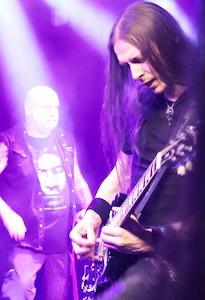 Yes, there's something there in Finland that people deal with and is unspoken but known. I would say that's the adjustment that you have to make for The X Factor. For the sound of it, it sounds very different. Going back to it, it's not an album that I've chosen to listen to a lot over the years. I'm a record producer, I produce my own albums, all of that.
Yes, there's something there in Finland that people deal with and is unspoken but known. I would say that's the adjustment that you have to make for The X Factor. For the sound of it, it sounds very different. Going back to it, it's not an album that I've chosen to listen to a lot over the years. I'm a record producer, I produce my own albums, all of that.
Then, going back for this, listening to it again from the point of, "Right, I'm performing this, but I'm not going to be precious about these arrangements. I'm not going to have keyboards on it. I'm not going to have unison guitars in, but I'm going to have the harmony guitars.
I'm going to build things, and I'm going to put this extra bit of vocal. I think that should be there. It feels like it should be there. I'm going to put that there. This is how I feel. This shouldn't be there. I want space now. I think, with my age and experience and confidence, I want that as space. I want that as focus on the voice. That's what's happened, really. I think it is that nostalgia, but nostalgia cleaned up. A bit more energy.
ABOUT FINNISH BLAZE MANIACS
You've always had strong support from Finnish fans. Do you have a unique significance in your relationship with your Finnish followers?
Blaze: Yes. I think my Finnish fans have been so loyal over the last 20 years, 30 years, some of them since I've made the Silicon Messiah album. Then after that, my Finnish fans have just been incredibly loyal, hardcore, coming to shows, every show, and getting tattooed. Almost like against the world. It's like, "This is my favorite singer, and I couldn't give a fuck what anybody else thinks." That's it. That's my Finnish fans.
I believe you may also have some cool stories about your Finnish fans that really have stuck in your mind over the years, don't you?
Blaze: Yes, I do indeed. The main one is that Mika from Mäntyharju booked Thomas Zwijsen and myself to his local pub. He went there and said, "I want Blaze Bayley to play here. Can you give me this money?" Then, when we got some more money from another pub and another pub. I think we did three or four shows on that tour.
Mäntyharju has been like a second home. We couldn't get the flight until the Monday after we'd played there and done a big Saturday night show. It just happened that it was Mother's Day on Sunday.
What we did was on Saturday night when we're doing the gig, we go, "Right, tomorrow moms are free. That's it. We're playing. We're going on stage at one o'clock in the afternoon and moms are free. If you want to bring your mom, it's free for moms." People did. It was really fun, man. Really fun. You could see some moms were okay. It's Finland so there's a lot of metal moms here, and some had been dragged along.
[*laughter*]
SOME MAGIC IS THERE IN MÄNTYHARJU
Blaze, you have mentioned many times earlier that you've spent some time in Mäntyharju, Finland. What makes this particular place so special to you?
Blaze: It's beautiful there. It's so beautiful there. Of course, it's so different to where I live. I was born in Birmingham, and I live just up the road from Birmingham in Dudley, which is a very industrial area. You don't really see a lot of lakes and nature there at all. It's very different.
This makes me think do you think that you might even record a Blaze Bayley album in Mäntyharju someday?
Blaze: I don't know. You know what? The great thing now is you only need a laptop and a microphone. That's it, and a little interface. Let's say, for 5,000 euros, you could have all the equipment you need to make an album that sounds as good as the last Iron Maiden album. If you develop the skills yourself, you can do that. You're not really restricted, and the costs aren't as much, so there's a lot more freedom with that.
It is up to you as an artist not to abuse that. In one way, what's going to happen is you'll be complacent because you've got it. You still have to fix your deadlines. You still have to go, "It's got to be finished here. We've got to work this much. We've got to do this," and it's still got to be good. It's still got to be something that, the way I think of it, that my fans can live with that album for a couple of weeks, listen through it a lot of times, and still like it, and then go to their friend who doesn't know about it, go, "Have you heard this? Let me just play you a track."
That's what I'm trying to create, every time. I'm thinking about being close-up and personal, and I'm thinking, "Right, how am I going to get you? How am I going to get you? I've got to get there through there."
That's the challenge that I'm trying to get every time.
You have two sold-out shows here in Helsinki, so what are your expectations from those shows?
Blaze: Insanity, chaos, just madness.
Madly behaving B.B. fans...
Blaze: Yes, just mad. I'm expecting madness. Sometimes I say, "Okay, and when we're in the studio, 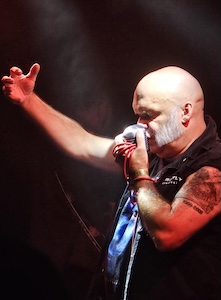 this happened or that happened," I don't think people will be bothered to listen. They'll just be shouting and screaming for the next song. A couple of the songs and the way that we perform them are different. They're surprising in that way, but it's a pleasant surprise, I think.
this happened or that happened," I don't think people will be bothered to listen. They'll just be shouting and screaming for the next song. A couple of the songs and the way that we perform them are different. They're surprising in that way, but it's a pleasant surprise, I think.
Of course, it's not just The X Factor. We do The X Factor, we do The B-sides, and then we've got another few songs as well. "Virus" is in the set list. That's been in my set for years, and I feel like it's really my song now. That's one of those songs that the lyric could have been written yesterday. It used to be, when that song was written, it was about the British music press slagging off Iron Maiden, saying they should give up.
Now, it's about scammers and people online slagging you off for what you do without consequence at all. They can say what they want about you, and they give no consequence. They'd never say it to your face, but they'll type it so everybody can see it, but they'll never say it to your face. They are the virus.
That's the downside of social media.
Blaze: Yes, that's the downside.
Yes, so they can hide anonymously and do their stupid things - and nobody knows who they are because they cowardly hide their identity behind some fake names.
Blaze: Yes, and they can come and get your money, and they could blackmail you.
You send your girlfriend a photo, they'll go, "Aha, right, his mates will really laugh at him because this is a really soppy photo," blackmail, and all that. It's a terrible, terrible side to it. The fantastic side of social media is me as an artist, I can say, "Hey, it's me. I'm doing this." The terrible side of it, is somebody else goes, "Oh, I'm Blaze Bayley. I'm doing this, give me €50." It's like, no, that's not real. There's something like five different people pretending to be Blaze Bayley on Facebook.
Oh, they really do that?
Blaze: Yes. Yes, it's horrible.
By the way, do you keep both your set lists the same for both nights here in Finland, or do you change some songs in them?
Blaze: I think it's changed slightly, but I'm not sure. I think we're deciding tomorrow because, of course, it's sold out the first night, and then we've added the second night, so a lot of people who come the second night won't be there on both nights. It's not like, "Oh, everybody's coming two nights." It's sold out, so people that couldn't get the ticket for that night could then get the ticket for the second night. It's a difficult one, really. I want everybody to hear everything, but also, if you are going two nights, then I want to surprise you as well.
Cool. I think my time is up, so I want to thank you for this pleasant conversation with you and wish you all the best for both of your shows here in Finland.
Blaze: Okay, thank you.
| Other information about Blaze Bayley on this site |
| Review: Silicon Messiah |
| Review: Tenth Dimension |
| Review: Blood & Belief |
| Review: The Man Who Would Not Die |
| Review: Promise and Terror |
| Review: Infinite Entanglement |
| Review: War Within Me |
| Interview with vocalist Blaze Bayley on June 30, 2018 (Interviewed by Luxi Lahtinen) |
The Metal Crypt - Crushing Posers Since 1999
Copyright © 1999-2026,
Michel Renaud / The Metal Crypt. All Rights Reserved.